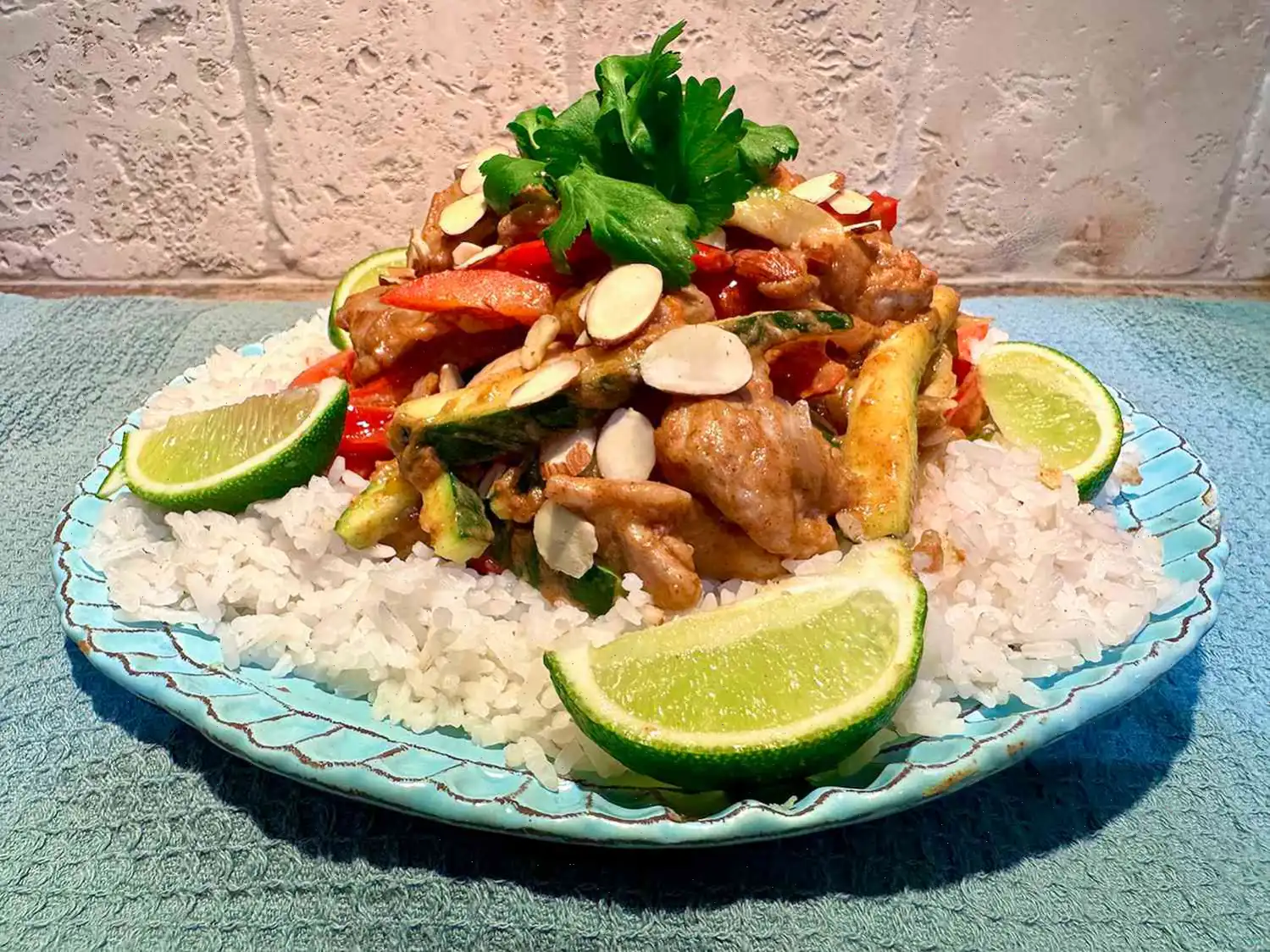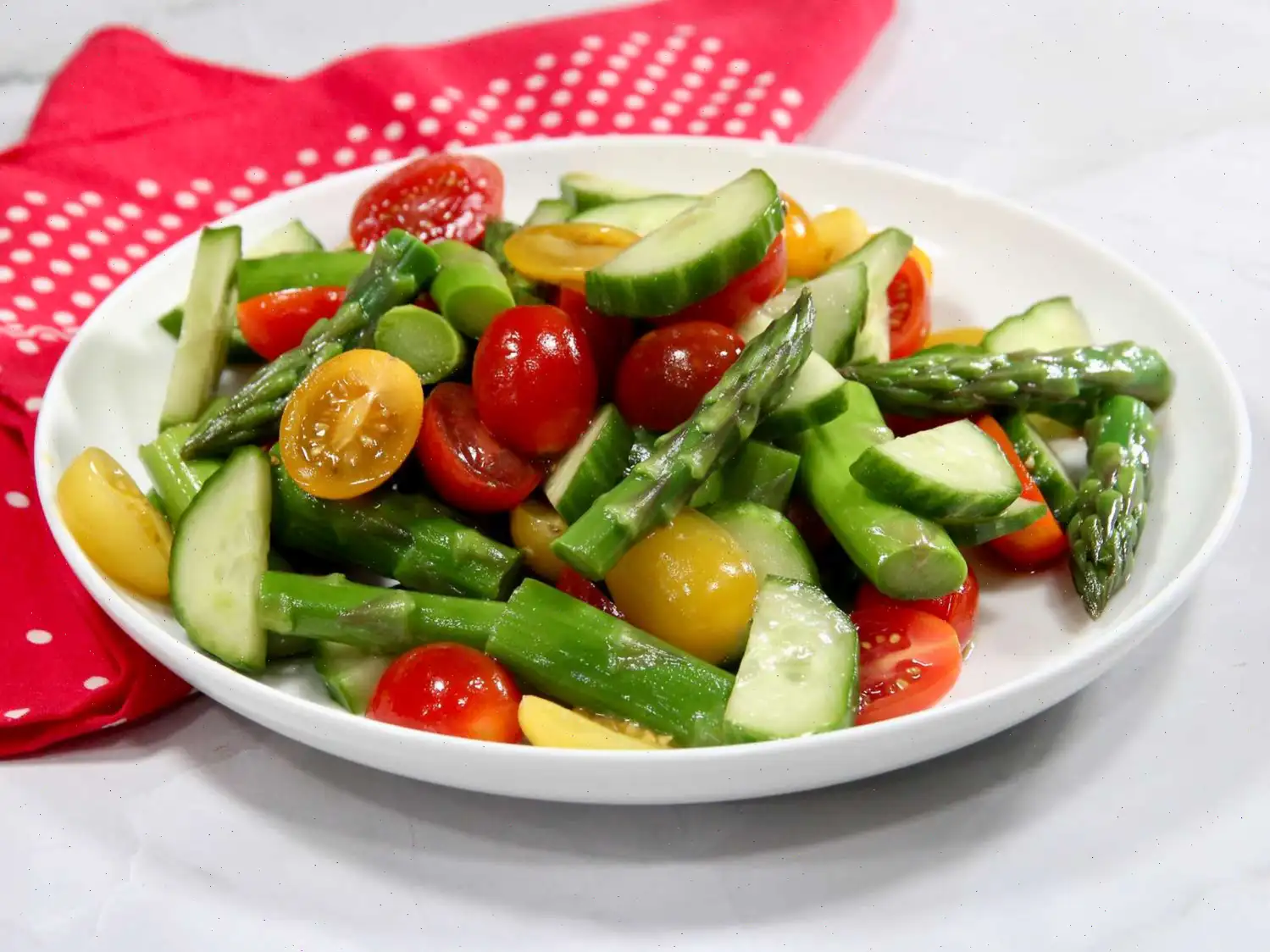
Esta receta de Pollo Salteado con Almendras es un plato delicioso y fácil de preparar para la cena. Con trozos tiernos de pollo, almendras crujientes y una salsa llena de sabor, seguro que le encantará a tu familia. Sírvelo sobre arroz o fideos para una comida completa, sabrosa y satisfactoria. Sigue los pasos sencillos a continuación para hacer este Pollo Salteado con Almendras en casa.
Pollo en Salsa de Almendras y Coco
Ingredientes
- taza de mantequilla de almendra
- taza de leche de coco
- taza de caldo de pollo
- 2 cucharadas de vinagre de arroz
- 2 cucharadas de jugo de lima fresco
- 2 cucharadas de salsa de soja o aminos de coco
- cucharadita de pimienta blanca molida
- 1 cucharaditas de salsa Sriracha
- 570 g de muslos de pollo sin hueso y sin piel, cortados en cubos de 2,5 cm
- Sal y pimienta negra recin molida al gusto
- 2 cucharadas de aceite vegetal
- 1 pimiento rojo, cortado en tiras finas
- 2 chalotas, finamente rebanadas
- 1 calabacn, cortado en juliana
- 3 dientes de ajo, picados
- taza de cilantro fresco, picado
- 2 cucharadas de almendras laminadas (opcional)
- 1 lima, cortada en cuartos (opcional)
Instrucciones
- En un bol amplio, combina la mantequilla de almendra, la leche de coco y el caldo de pollo. Aade el vinagre de arroz, el jugo de lima, la salsa de soja (o aminos de coco), la pimienta blanca, la pimienta negra y la Sriracha. Mezcla bien hasta obtener una crema homognea y reserva.
- Seca los trozos de pollo con papel de cocina y sazona ligeramente con sal y pimienta negra.
- Calienta el aceite en una sartn grande a fuego medio-alto. Dora el pollo durante 6-8 minutos hasta que est completamente cocido y ligeramente dorado. Retira y reserva caliente.
- En la misma sartn, aade el pimiento rojo y las chalotas. Saltea durante unos 3 minutos hasta que empiecen a ablandarse.
- Incorpora las tiras de calabacn y cocina 1 minuto ms, moviendo con frecuencia.
- Agrega el ajo picado y cocina 30 segundos hasta que desprenda su aroma.
- Devuelve el pollo a la sartn y vierte la mezcla de mantequilla de almendra. Remueve suavemente para cubrir todos los ingredientes y deja que se integren los sabores durante 2-3 minutos.
- Espolvorea el cilantro fresco y, si lo deseas, aade las almendras laminadas. Sirve acompaado de los gajos de lima para un toque cido.
Consejo del Chef
Si buscas una alternativa sin soja, los aminos de coco aportan un sabor ligeramente dulce y suave. Para imitar esta dulzura usando salsa de soja comn, aade una pizca de azcar al gusto.
Informacin Nutricional por Porcin
| Nutriente | Cantidad | % Valor Diario* |
|---|---|---|
| Caloras | 489 | - |
| Grasas Totales | 32 g | 40% |
| Grasas Saturadas | 7 g | 37% |
| Colesterol | 173 mg | 58% |
| Sodio | 664 mg | 29% |
| Carbohidratos Totales | 15 g | 6% |
| Fibra Diettica | 4 g | 15% |
| Azcares Totales | 6 g | - |
| Protenas | 41 g | 82% |
| Vitamina C | 62 mg | 69% |
| Calcio | 116 mg | 9% |
| Hierro | 4 mg | 19% |
| Potasio | 899 mg | 19% |
*Los valores diarios se calculan en base a una dieta de 2,000 caloras.
El salteado de pollo con almendras es una versin moderna de los clsicos platos de salteado chinos, que han sido fundamentales en la cocina de China durante siglos. La tcnica de saltear a fuego alto se remonta a la dinasta Han, alrededor del ao 200 a.C., cuando cocinar rpidamente era ideal para conservar el sabor y los nutrientes de los ingredientes frescos. La incorporacin de almendras al pollo probablemente surgi en Estados Unidos, cuando los inmigrantes chinos comenzaron a combinar tcnicas tradicionales con ingredientes locales. Esta mezcla de frutos secos y pollo aporta un toque dulce y crujiente que lo diferencia de las recetas ms tradicionales.
Variaciones Regionales
Las diferencias regionales en el salteado de pollo con almendras reflejan a menudo los ingredientes disponibles localmente y las preferencias de cada comunidad. En el sur de China, el plato puede incluir castaas de agua o brotes de bamb para aportar textura, mientras que en el norte se suelen usar salsas ms dulces como hoisin o salsa de ostras. En las versiones occidentales, especialmente en Estados Unidos, se emplean almendras tostadas o mantequilla de almendra, junto con vegetales como pimientos y calabacn, ofreciendo tanto color como equilibrio nutricional. La adicin de leche de coco y jugo de lima, como en esta receta, aporta un toque de fusin inspirado en los sabores del sudeste asitico.
Diferencias con Platos Similares
Aunque el salteado de pollo con almendras comparte similitudes con platos como pollo con anacardos o el pollo salteado general, se distingue por la eleccin del fruto seco y la composicin de la salsa. Las almendras aportan un sabor ms suave y un crujido ligeramente dulce, diferente de los anacardos o cacahuetes. La combinacin de mantequilla de almendra y leche de coco en la salsa lo separa de los salteados tradicionales a base de soja, creando una cobertura cremosa y ligeramente cida para el pollo y los vegetales. A diferencia del pollo Kung Pao clsico, este salteado evita sabores muy picantes o con exceso de pimienta de Sichuan, buscando un equilibrio que agrade a todos los paladares.
Dnde se Sirve Comnmente
El salteado de pollo con almendras es frecuente en los mens de la cocina chino-americana, en restaurantes familiares y en cocinas domsticas que buscan comidas rpidas y saludables entre semana. Generalmente se sirve sobre arroz al vapor, fideos o alternativas bajas en carbohidratos como arroz de coliflor o fideos de calabacn. Su presentacin colorida y sus ingredientes nutritivos lo convierten en una opcin popular para almuerzos especiales, cenas en familia y reuniones informales. En restaurantes de fusin asitica ms sofisticados, puede presentarse con guarniciones de cilantro fresco, almendras laminadas y rodajas de lima, ofreciendo un plato atractivo y lleno de sabor.
Datos Interesantes
- Las almendras son smbolo de buena suerte y prosperidad en la cultura china, lo que explica su frecuente aparicin en platos de celebracin.
- El salteado a fuego alto conserva vitaminas y realza los sabores naturales sin necesidad de usar aceites pesados.
- El salteado de pollo con almendras es considerado un placer saludable, ya que aporta protenas del pollo, grasas saludables de las almendras y vitaminas de los vegetales frescos.
- Las adaptaciones modernas muestran la fusin de tcnicas asiticas con ingredientes occidentales, reflejando cmo la gastronoma evoluciona mediante el intercambio cultural.
- El uso de mantequilla de almendra en la salsa es un giro contemporneo que aporta cremosidad sin lcteos, adecuado para personas con intolerancia a la lactosa.
Puedes escuchar esta receta en formato de audio de IA. Simplemente haz clic en el botón de reproducción a continuación para escuchar el contenido en el formato que mejor te convenga. ¡Es una excelente manera de absorber información sobre la marcha!







